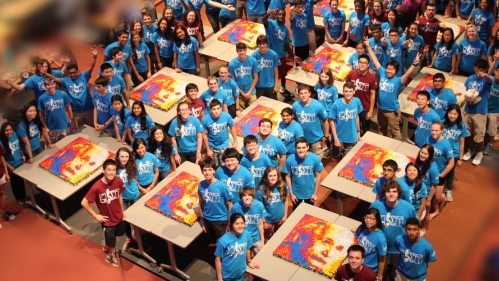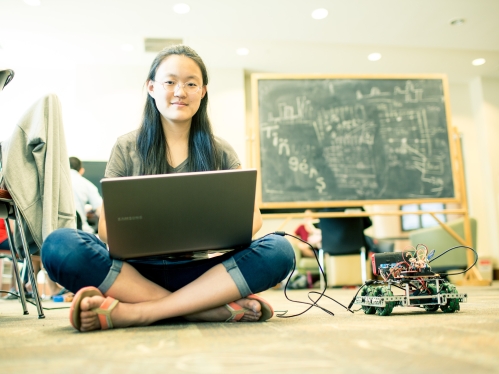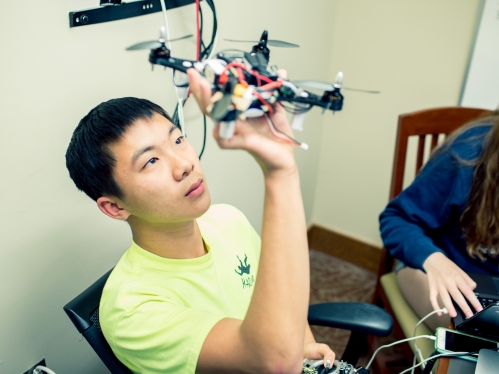
The Governor's School of New Jersey in Engineering & Technology
The Governor's School of New Jersey in Engineering & Technology
The Governor's School of New Jersey in Engineering & Technology at Rutgers University is an intensive residential summer program that brings together some of New Jersey's most talented and motivated high school students.
The Experience
Free of grades and official credit, students spend part of the summer following their junior year studying on the campus of the Rutgers University School of Engineering at no cost to their families.
During the program, students will have the opportunity to collaborate on a novel research project which will be showcased in a conference-style final paper and presentation during a culminating research symposium. The program also includes workshops, site visits to local corporations, and activities with professors, professionals, and peers from throughout the state.

The Academic Program
All students take four academic courses at the Governor’s School of New Jersey Program in Engineering & Technology and experience a small research and design project along with the opportunity to visit 2-3 local corporations to learn about future career prospects.

Application Information
To be considered for the program, applicants must be nominated through their high school. Schools can nominate one applicant for every 325 members of their junior class. The program is competitive, offering admission to fewer than 100 students.

Frequently Asked Questions
-
There is no cost to students or their families. The entire cost of the experience (nearly $3,000 for tuition, room, and board) is sponsored by donations from corporations, foundations, alumni, and individuals. At the start of the program, students present a $65 check as a key deposit, which is returned (uncashed) at the conclusion of the program when keys and swipe cards are returned.
-
The program lasts approximately 4 weeks and starts close to the begining of July. The program ends with a research symposium highlighting the students' work will be held on the afternoon last day. Parents, teachers, and friends are encouraged to attend in addition to the corporate sponsors, professors, and guests we invite. Please note that work on your research project will begin prior to the start of the residential program. You'll be expected to spend about 40 hours prior to begining of the program reading scientific papers and writing up ideas relating to your project.
-
In a difficult fundraising climate, the size of our program is based on our fundraising successes. In the past three years, the size of the program has fluctuated between 62 and 90 scholars.
-
We will announce decisions via email in early April, please refer to the application for the exact date in April. PLEASE MAKE SURE TO CHECK YOUR JUNK MAIL/SPAM FOLDER.
-
We will send decision emails to the email addresses for both students and parents listed on the application. If you prefer a different address, please let us know by emailing Engineering Honors Academy director Jean Patrick Antoine at j.antoine@rutgers.edu.
-
Our admissions decisions are based heavily on your reasons for wanting to attend Governor's School, personality, and interests, as described in your essays. We really try to get to know you through your application. Since our Governor's School involves so much small-group collaboration, your personality, your ability to work with others, and your interest in engineering are more important than your standardized test scores (although we do expect those to be very high, as well).
-
We try to craft a student body each summer that is diverse in myriad ways. Rather than being antisocial computer geeks, you'll find that our students are very interesting, outgoing, and multitalented... but also a little bit nerdy. Many of our students relish the fact that they're among peers who love math, science, and engineering, but also enjoy sports, music, art, and dancing. In previous summers, outside of the classroom, we have had plenty of pick-up soccer games, a talent show, student-organized dances, music jam sessions, and a visual arts show of students' work. The only thing we can't guarantee you during the program is a consistent good night's sleep-- there's so much going on, you won't have time for it!
-
All students who received their high school's nomination and submitted completed applications by the deadline are considered nominees. There is no such thing as a "semifinalist" and our April decision letters reflect the only round of screening. All applicants will be notified by email in April about their status.
-
Yes. We arrange van trips on Sundays to local services, but can also make special arrangements (possibly with the assistance of the student's parents) for religious services.
-
As long as you have taken honors math and science classes in high school, you'll be fine. Some of our elective classes may have further prerequisites, but everyone will be qualified for at least one class in each elective category.
-
Not very much, but we do make sure that you have some free time. We give a significant amount of work, but it's almost entirely group work and generally very interesting and fun. The problems we give require a lot of thinking and very little rote memorization, and our instructors actually require that you work with other students to do it. We try to make our classes as hands-on and interactive as possible. We realize that this is summer, and that you certainly don't want to waste the great weather by sitting in the back of a dark lecture hall listening to someone drone on for hours. While we won't feel bad giving you a lot to do, we would feel bad if your projects, classes, and assignments were boring. By the same token, we do enjoy getting everyone out of the classroom to play soccer/frisbee/volleyball/etc., but this is a supplementary activity and won't be available every day.
-
Engineering disciplines can broadly be defined as areas of engineering. Biomedical Engineering is a discipline. Computer Engineering is an engineering discipline. Aerospace Engineering is an engineering discipline. Nuclear Engineering is an engineering discipline, although one which we will unfortunately not cover at Governor's School. Simply choose the three you find most interesting or most want to learn about. To further explore the range of possibilities, try Googling "engineering disciplines" or investigating the Rutgers Engineering majors. Seriously, don't lose any sleep over this choice.
Support GSET
Make checks payable to: Rutgers School of Engineering
Mention "Governor’s School of NJ in Engineering & Technology" in the memo line.
Mail donations to:
The Governor’s School of New Jersey in Engineering & Technology
98 Brett Road
Piscataway, NJ 08854
All donations are tax deductible.
To sponsor a GSET activity or project, please contact Jean Patrick Antoine.